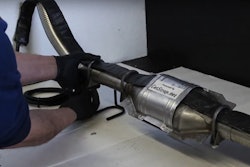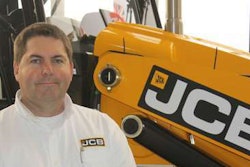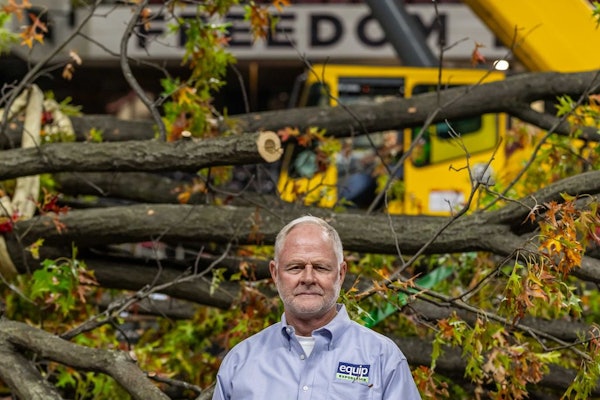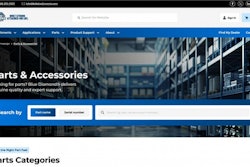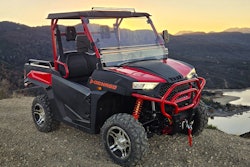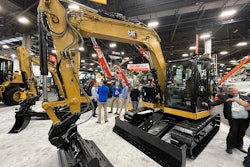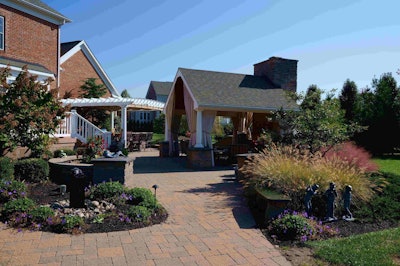 TDH Landscaping demonstrates its expertise in design, construction, plant selection and installation in this project for a residential client.
TDH Landscaping demonstrates its expertise in design, construction, plant selection and installation in this project for a residential client.Photo: Patty Pohuski
At TDH Landscaping, family means everything.
For 50 years, the Monkton, Maryland-based company has taken pride not only in building a sound, highly respected business for succeeding generations but also in nurturing strong relationships with each of its employees.
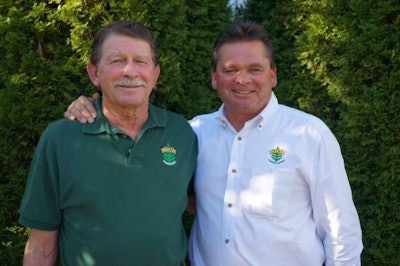 Richard Irvin, left, poses with his son Russell, who is working to ensure TDH Landscaping is around for another 50 years.
Richard Irvin, left, poses with his son Russell, who is working to ensure TDH Landscaping is around for another 50 years.Photo: Patty Pohuski
Co-owner and principal Russell Irvin says working as a team, or a family, has gotten the company to where it is today.
“It’s not all about me,” Irvin says. “It’s not about the margins for me. It’s about the margins for the survivability of the company so that everyone else in this company can have a good life and can take care of their families.”
TDH Landscaping started in 1965 after Irvin’s grandfather, Harry Irvin, purchased a piece of property and asked his sons, Richard (Dick) and Tom, to join him in the business – hence the acronym TDH.
Richard worked the 44 acres of nursery while Tom managed the books. The landscaping side of the business was established shortly thereafter.
“I’m an outside person 100 percent,” Richard says. “We kept expanding and putting in plants, and it was something I liked to get into.”
In 1982, Russell Irvin, Richard’s son, started working full time at the business. By 1990, Russell began to take the reins at TDH.
It was a couple of years later, Russell recalls, in 1992, that Nathan Boliek joined the company as design and sales manager. “He and I really worked together to try to build things to the level that they are today,” Russell says. “We made a lot of current day changes from the old school way of things. We worked on ways of estimating and really worked on trying to take things to a different level.”
The nursery and landscaping sides of the business now operate as separate companies. During the peak season, they employ about 60 people.
TDH Landscaping serves mostly residential customers, although it does have some commercial clients. Its services include landscape maintenance, design/build, landscape lighting, water features, pools, erosion control and complete outdoor construction.
In addition to focusing on design excellence, Russell says, TDH took care to build the expertise necessary to diversify its services. Developing that broad level of competency – whether construction, planting or design work – has helped sustain the company through rough economic times.
“Whatever it may be,” he says, “we have to have these avenues to go into so that we can keep and care for the employees that we have.”
Expanding views
Needless to say, not all the employees at TDH are actual family members, but the company says everyone is treated as a brother or sister, including the seasonal workers TDH employs through the H-2B program. The federal program provides temporary visas to foreign workers for non-agricultural seasonal work.
“The fact is, especially in this area, we don’t have a labor pool to pull from, so we reached out about 20 years ago and hired some temporary laborers that were Hispanic,” Russell says. “Over our evolution, we found the H-2B program and were able to bring people over and work with them and found how much of a value it added to our company. We’re just revitalized by their work ethic.”
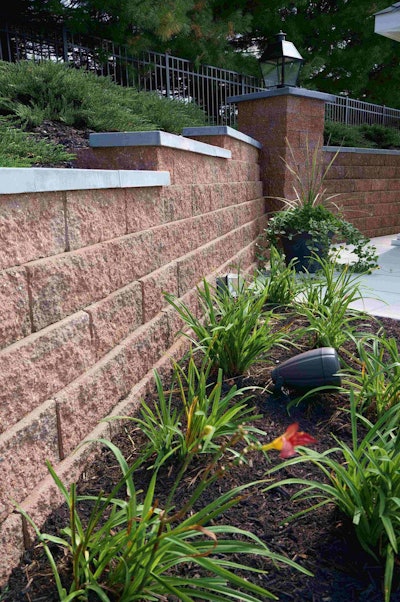 Extensive plantings on either side of a retaining wall, along with the wall itself, illustrate the company’s attention to quality and detail.
Extensive plantings on either side of a retaining wall, along with the wall itself, illustrate the company’s attention to quality and detail.Photo: Patty Pohuski
Many of TDH’s H-2B workers bring a unique skillset to the table, such as unmatched masonry skills or a great deal of knowledge about specific jobs. Many workers have been with the company for 15 to 20 years and occasionally introduce a skilled brother, uncle or cousin to the team.
“It actually costs a premium to have these guys work for us,” Russell says. “The kind of work they do for us is irreplaceable. We couldn’t get that talent or skill here.”
TDH also goes out of its way to care for the H-2B workers, including taking care of living arrangements and helping translate for medical visits.
“If there is anybody that is ill and has problems communicating to the medical field, we are there to help at any time,” Russell says. “We do an awful lot for them that’s over and above what I would think most companies would do.”
TDH offers an incentive program for all workers in the company except managers. Management hands out tickets for exceptional performance by any employee. Every month a ticket is drawn from a hat and that employee receives a gift.
“Ten years ago there was a lot of discrimination, and we really showed people and explained to people to not have that mindset about these folks,” Russell says. “These folks are some of the best people you could ever meet.”
Finding success, together
Russell Irvin and his team also felt the pangs of recession through the years. Most companies find various ways to survive downturns in the economy, and Russell and his team were quick to discover the way to survive was working even closer as a team.
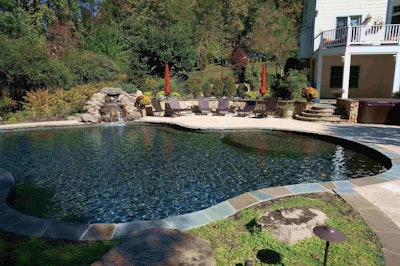 Hardscaping and plantings complement, rather than overwhelm, a water feature in this design.
Hardscaping and plantings complement, rather than overwhelm, a water feature in this design.Photo: Patty Pohuski
“The number one thing that got us through the recession was us,” Russell says. “There were tough times, and there were no complaints. Everybody did what he or she needed to do to make it work. If we didn’t have that, then we would’ve struggled a lot more than we did.”
Boliek, the design and sales manager, says a big part of maintaining business through the recession was how the company approached handling clients’ needs. By working within a client’s budget, gaining their trust and creating a lasting relationship, the company was able to find success.
“It was basically like a football huddle,” Boliek says. “We sat down in many management meetings to tighten belts. When we came out on the other side of it, we felt like a leaner, more functioning group than before.”
The recession also pushed Russell Irvin to diversify, capitalizing not only on his staff’s experience but also researching additional services TDH could offer.
Along the way, Russell says, taking care of his employees remained a priority.
“I valued this team very much, and I didn’t want to let anybody go,” he said. “I’d rather have the ship sink than start to get rid of its shipmates, because without them, what is the ship? The ship won’t sail itself.”
Building toward the future
The company’s ability to find success through difficult times says a great deal about the its future.
In fact, in 2015 TDH offered a “Green Scholarship” to a graduating senior at a local high school in Richard’s honor.
“I’d like to see the company stick around another 50 years if it can,” Russell says. “I’m not trying to build the company just for myself and walk away.” It’s no accident that the son’s observation echoes the legacy his father helped to build.
“I think the company is its own entity,” Russell says. “It’s all of us, and this is our livelihood, so it’s important that the company continue.”

